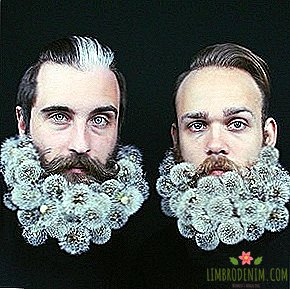Chemistry in everyday life: people against cosmetic laboratories
Maria Atchikova (Cosmopolitan Shopping) - about why you should not be afraid of large corporations, whether “chemistry” is really harmful and whether you should feel sorry for rabbits.
Maria Atchikova is a beauty editor at Cosmopolitan Shopping magazine. The first article is XXL magazine, the first real journalistic work is the editor of OM magazine, the first important work is the editor-in-chief of Dolce Vita magazine. Most of everything in the beauty industry loves the concentration of creativity with an explosive mixture of science and technology. She loves her job, where some news happens every day. Good - more often. |
"Chemistry in everyday life" is a book that I read to holes in my childhood. In her painted curly little man talked about what makes soap and how to wash with ash. It is curious that it turned out to be relevant now, when the whole world seems to be going crazy with hysteria about silicones, parabens and preservatives. And at the same time, the same world continues to believe in the naturalness of essential oils. Nothing that they somehow get and clean, we are above these details. To believe in "without chemistry" is much easier.
Big is always angry. We, small consumers, will always be afraid of impersonal corporations. And this fear is so irrational that we do not understand that behind each jar and bottle there is a human face and hands - sometimes it is one scientist, sometimes several. They are alive, sometimes similar to crazy professors, but open to the world - because all scientific discoveries in cosmetology are based on natural components and total coincidences, and they must be seen.
The Pitera component is contained in SK-II cosmetics.
Pitera - a mixture of vitamins and amino acids, one of the most well-known anti-aging ingredients - appeared thanks to the young hands of older Japanese who produce sake. Scientists took 5 years to recreate the fermentation process and find out exactly which of the different types of yeast has such an effect on human skin. A similar story is in Koishimaru silk, which moisturizes women's hands in silk factories. Algae survive in the dark and cold - scientists study these algae, cut off excess components, as if cutting out a molecule that is ideal for human skin. In Africa, researchers have found a thorn that can live for three years without water? We take, spend a dozen years studying, look for ways of production, settle problems with African defenders of thorns, prove to certification authorities that the manufacturer is not a camel, and find another alternative to the rejuvenating apple.
Brown algae are part of Le Soin Noir Givenchy
And here we would all merge in ecstasy, but it does not come out. The consumer is dissatisfied - it seems to him that the manufacturer must personally squeeze the juice of the spines into the bottle, add water, not use preservatives, parabens, make the cream's texture delicate, and the aroma pleasant. And without chemistry, because we do not understand your difficult words! Stop pissing us off!
The truth is that now nobody is interested in releasing a batch of terrible chemical weapons in order to pump it to consumers and wash their hands. If, of course, we are not talking about craftsmen who want to make quick money and go to Goa, but these are still visible at the stage of acquaintance with the brand. Now it is much more important to create a tool that will be sold for years, and better for decades - this is a gold reserve, an own Klondike for any corporation. The fact that you will buy a bank for a jar, something that at least will not cause allergies and will not cause harm, but ideally will really help.
Cream Clinique Comfort on Call contains extract of jabar, a rare citrus. His homeland is Chinatāma. Locals call him "expelling evil": the disease does not come close to you, if you have it every day - which they do
Over the past ten years, we - small, helpless consumers - have come a long way. It was we who taught the manufacturers to be open, and now everyone has the opportunity to drive in all the ingredients of the cream and see what we are smearing ourselves every day. We were outraged - and IFRA forbade the use of animal ingredients and most of the ingredients of plant origin, the world has lost dozens of legendary flavors, but surely this is for our own good. The FDA prohibits packs of ingredients due to allergenicity and side effects, and the highest rates are natural.
Buchu - South African grass. Local fishermen rubbed their leaves with their hands to get rid of the smell of fish. Now she is part of Clarins deodorants.
A simple example: Ephedra, a nutritional supplement that caused a monstrous scandal due to heart attacks and strokes in the past, was guilty of an absolutely natural herbal ingredient. We call it completely harmless, Kuzmichevoy grass. The second example is bergamot: it cannot be used in the sun, and it can easily be part of your favorite perfume. But at the same time - suppose that the manufacturer honestly writes to us: "And we made our bergamot in the laboratory, it is absolutely safe." And he will bring the three-story formula of synthesized bergamot - which, naturally, will not be phototoxic and if it doesn’t smell anything like the real one, most will not notice. But then he will start to panic, suggesting a terrible mythic danger.
Or, for example, opened a new sunscreen ingredient - berrinol. The research results are amazing. Some scientists call it a breakthrough in the study of carcinoma and protection from dangerous sunlight - which have already been officially named the cause of cancer. But there is a small nuance: in addition to research on plant and human cells, the component was tested ... on mice. I wonder if the cancer medicine will ever be rejected by society for this reason? Because the vegetable alternative to chemical filters from the sun right now causes indignation flows - the planet is in danger, we love the ecology and cheerfully march under green flags.
In Belle de Jour Kenzoki there is a lotus: “It is called the flower of purity. It grows in different places and in different conditions, but the flower itself is always perfect”
We were so sorry for the rabbits, who were spared by Hollywood stars with us, that we voted to stop testing cosmetics on animals. I understand when vegans and vegetarians oppose killing rabbits. With them, in general, everything is not easy - an interesting experiment was conducted here. If you plow through a thousand scientific terms, you will realize that the differences between vegans and meat eaters are much deeper than you can imagine. Omnivorous comrades most actively respond to the suffering of people. The brain of a vegan triggers a mechanism of social cognition — something that distinguishes justice for us from injustice — when it sees the torment of animals. At the same time, for some reason everyone fought for the lives of rabbits against cosmetic corporations, led by an allegedly free press, splashing out babies with water.
On the Guerlain website you can watch several video films with the stories of scientists about laboratory studies of orchids.
Now humanity continues to kill rabbits - and continues to eat them, and preferably stewed in wine. Manufacturers are doing everything they can - using in vitro testing, examining components for toxicity, collecting volunteer focus groups and testing performance. It turns out a strange story - the old ingredients, which were obtained back in the days when rabbits sacrificed themselves in the name of science, are easier to use than new ones. Which could be more effective, because science walks, nanotechnologies are multiplying, molecules decrease in size and learn to penetrate deeply. It turns out that we test cosmetics on ourselves and at the same time we are outraged that the manufacturer is not sufficiently prudent - not only is the sensitivity to the cream always individual, it cannot guarantee absolute, one hundred percent (or better and all 200%) security.
But, friends, this is our merit.




